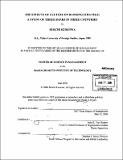The effects of culture on banking strategy : a study of three banks in three countries
Author(s)
Kuroiwa, Seiichi
DownloadFull printable version (8.977Mb)
Other Contributors
Sloan School of Management.
Advisor
John E. van Maanen.
Terms of use
Metadata
Show full item recordAbstract
Every company pursues a different strategy, and banks are no different. In the banking industry, each bank performs its business based on its own business strategies. Japanese banks have different strategies, but in terms of Japanese banks as a whole, there is little difference among them. From my prior work experience in Germany, I became aware of obvious differences between Japanese banks and German banks in terms of thought processes and doing business--despite being in the same industry. I believe cultural issues have a significant effect on each bank's strategy. The diverse strategies among banks have evolved from the various ways of thinking, sensing, and doing, which are formed based on deep-seated cultural values or assumptions in each country. In this thesis, in the first section, I discuss a specific system implementation project, which provides a framework for identifying fundamental problems and developing a theoretical approach toward the problems. Then I analyze the cultural effects on Japanese, German and US banks, comparing the data analysis and personal interviews among three banks. (cont.) My desire is to shed light on the differences among banks in three countries and to reveal the reasons for such differences. It is hoped that this will give Japanese banks a substantial push so that they will differentiate themselves before global competition becomes even more severe.
Description
Thesis (S.M.)--Massachusetts Institute of Technology, Sloan School of Management, 2006. Includes bibliographical references (leaves 162-166).
Date issued
2006Department
Sloan School of ManagementPublisher
Massachusetts Institute of Technology
Keywords
Sloan School of Management.